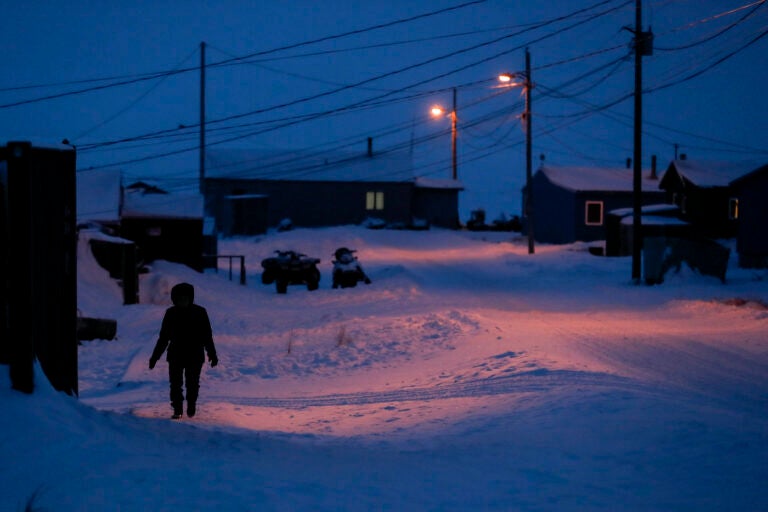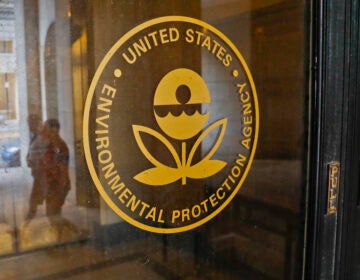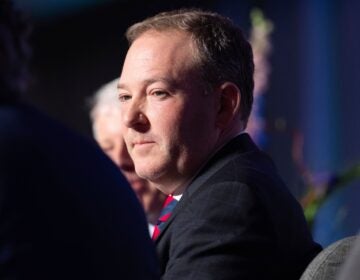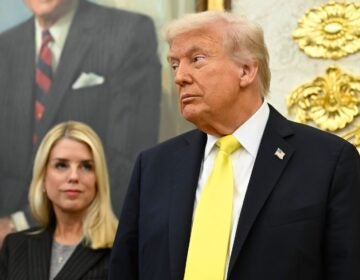Why many scientists fear a second Trump term
Political interference was well documented across the government during the Trump administration.

In this Jan. 20, 2020, file photo, a woman walks before dawn in Toksook Bay, Alaska, a mostly Yuip'ik village on the edge of the Bering Sea. A federal grant will allow an extensive trail system to connect all four communities on Nelson Island, just off Alaska's western coast. The $12 million grant will pay to take the trail the last link, from Toksook Bay, which received the federal money, to the community of Mertarvik, the new site for the village of Newtok. The village is moving because of erosion. (AP Photo/Gregory Bull, File)
Joel Clement is a forest ecologist by training. But like many civically minded science types, he wanted to use his scientific expertise to affect people’s everyday lives.
So Clement joined the government. Over the course of seven years at the Interior Department, he worked on policies meant to help communities in Alaska that are threatened by thawing permafrost and rising sea levels from climate change.
The work was both scientifically and politically complicated — entire towns need to be moved. Part of Clement’s job was to draw attention to their work and to the serious climate-related problems facing people in Alaska, where temperatures are rising much more quickly than the national average.
“I was very public about saying, ‘Hey, these communities are at risk — the threat is growing,'” Clement says. “These are Americans who could become refugees in our own country.”
The work was moving forward, albeit slowly, under the Obama administration. But shortly after President Donald Trump took office in 2017, Clement and others were reassigned. His new job was in the office that collected royalty checks from oil and gas companies drilling on public lands. The Trump administration moved to gut the effort to protect Alaskan communities as part of a government-wide effort to stop working on climate change.
“It was a real threat to Americans’ health and safety,” Clement says. “We were working pretty hard to get people out of harm’s way in Alaska, and no one would be doing that any longer in a coordinated fashion” at the Interior Department.
Clement chose to resign and become a whistleblower, while others on his team chose to stay despite the challenges, and kept working to assist some Alaskan communities with the help of Congress. Ultimately, Clement was one of dozens of scientists who resigned or blew the whistle over what they saw as political interference and censorship of science by the Trump administration.
Now, many scientists are concerned that such interference could be even more severe in a second Trump term, with serious implications for everything from the safety of the air that Americans breathe to the accuracy of weather forecasts that millions of people rely on each day.
“It was very hard to be a scientist”
Political interference was well documented across the government during the Trump administration. At the Environmental Protection Agency, policymakers were barred from considering studies about the deadly effects of air pollution. At the Agriculture Department, information about the effects of climate change on crops was censored.
At one point, Trump personally misrepresented a hurricane forecast, suggesting that a major storm might hit an entirely different state than expected.
Many scientists found themselves targeted by political appointees. The Climate Science Legal Defense Fund, a legal aid group for scientists, saw a surge in requests for help from scientists during the Trump administration.
“We worked with scientists who were terminated from their positions because they spoke out about climate issues, who were reassigned because they work on climate, who were censored, whose research was manipulated,” says Lauren Kurtz, the executive director of the fund. She says the Climate Science Legal Defense Fund received about 300 requests for assistance during the Trump administration.
“I think it was very hard to be a scientist in the Trump administration. A climate scientist for sure,” Kurtz says.
Trump’s campaign did not respond to questions from NPR.
There are signs that such interference and censorship could be even more severe in a second Trump term. Former Trump officials and other conservative activists have already put out a road map, called Project 2025, for transforming the whole federal government. Its environmental proposals include eliminating the EPA office tasked with reducing pollution in minority communities, cutting back on monitoring of greenhouse gas emissions that fuel climate change and getting rid of the main government office that does atmospheric research.
The Project 2025 authors describe the National Oceanic and Atmospheric Administration — which includes the National Weather Service and offices that support fisheries and monitor air quality — as a “colossal operation that has become one of the main drivers of the climate change alarm industry,” and they propose gutting it.
The authors of Project 2025 declined to answer NPR’s questions about the plan. A spokesperson responded only to say that Project 2025 was assembled by more than 100 conservative organizations that are “preparing to offer recommendations to the next conservative president. Project 2025 does not speak for any candidate or campaign.”
Trump has distanced himself from the effort, writing on Truth Social: “I disagree with some of the things they’re saying and some of the things they’re saying are absolutely ridiculous and abysmal.”
But the former president has also signaled that he agrees with many of the plan’s proposals. He avoided questions about climate change during the June presidential debate and reiterated plans to pull the U.S. out of the landmark Paris climate agreement. In an interview with Fox News last month, Trump said, “One of the things that is so bad for us is the environmental agencies. They make it impossible to do anything.”
One of the most sweeping proposals in the Project 2025 plan would make it easier to replace civil servants. If that happened, people in positions like the one Clement had — working on climate impacts in Alaska — could be fired en masse by a new Trump administration.
“There is anxiety with a second Trump term. They will be better prepared than the first term,” says Jennifer Orme-Zavaleta, the former acting assistant administrator of the EPA’s Office of Research and Development.
How scientists are preparing for a potential Trump win
Multiple efforts are underway to protect government scientists from political interference. In June, the main labor union representing EPA employees strengthened scientific protections under its new employment contract. The contract requires that EPA scientists be allowed to discuss their scientific work with the media and at scientific conferences.
The White House is also working to strengthen scientific integrity policies that protect government scientists from interference. However, such rules could be undone by a new president, which has led some scientists to call on Congress to make such protections law. But Congress hasn’t moved to do so.
“Folks will be a little more ready — a lot more ready, frankly — for the scope of this assault on science, if Trump were to be elected,” says Clement, who says he has also noticed many scientists speaking out more about misinformation in their fields.
Those who persisted in their scientific work under the Trump administration can also offer hints about how to avoid or minimize political interference.
Dan Costa worked on climate and air pollution research at the EPA for more than 30 years before retiring about a year into the Trump administration. He says working under Trump was extremely difficult. He says that he received memos from higher-ups warning not to use the word “climate” in work products and that the administration even removed the word “climate” from the name of the office he was in charge of: the Air, Climate, and Energy Research Program.
“Every single administration I ever dealt with kept in mind what the mission of the agency was: the improvement of public health, [the] improvement of air quality,” Costa says. “This was the first time that I encountered a group that came in that did not care.”
Costa handled the political interference by finding ways to keep his team’s work moving forward under the radar. One of the most important projects he was working on at the time was about how to reduce the health impacts of breathing wildfire smoke.
As the planet heats up, intense wildfires are becoming more frequent, and the smoke can create dangerous — or even deadly — conditions even hundreds or thousands of miles away, as millions of Americans have experienced firsthand in recent years. Costa and his team were at the beginning stages of studying the problem and thinking about potential solutions, including how to provide more accurate and timely smoke information.
The work was so important, Costa says, that he delayed his retirement until he was sure it was on firm footing. As a government scientist, his job was to give people the information they needed to make potentially life-or-death decisions.
“People wanted to know: What is my risk and the risk to my family? Do we stay when there’s a fire, or do we leave? Do we close all the windows? Do we turn off air conditioning? Do we have [air purifiers] indoors to help remove some of the particles from the air?” Costa says. “People want to take action, but they had no tools.”
Costa says he successfully found ways to describe his wildfire-related work to Trump administration officials in ways that minimized its connection to politically charged topics like climate change and air pollution regulation. Today, pilot programs are underway to deploy indoor air filters in some fire-prone communities.
He says young scientists shouldn’t be afraid to join the federal government, despite the potential for censorship. “You can speak truth to power,” says Costa. “You’re right there where the action is.”
Clement agrees. “Go into this work,” he tells those who are considering working in science-based policy fields. “Be ready. Have some energy. Tap out when you need to. But this is incredibly important, and it’s an all-hands-on-deck time.”
NPR climate correspondent Michael Copley contributed to this story.

Get daily updates from WHYY News!
WHYY is your source for fact-based, in-depth journalism and information. As a nonprofit organization, we rely on financial support from readers like you. Please give today.




